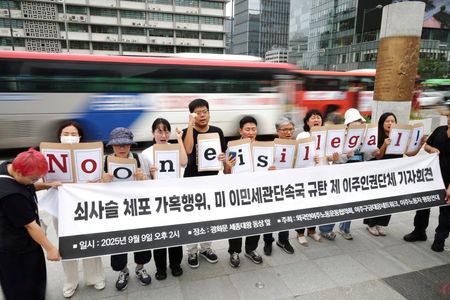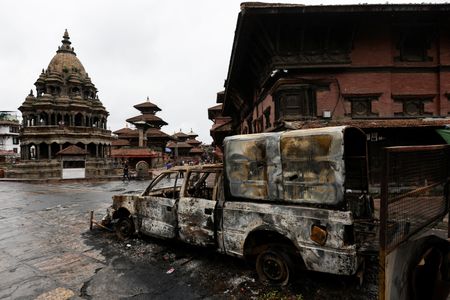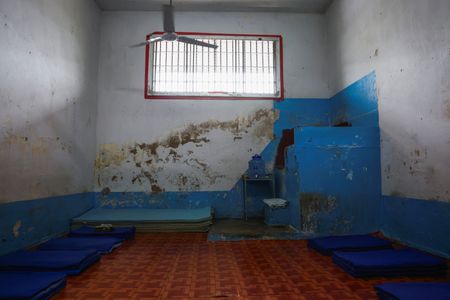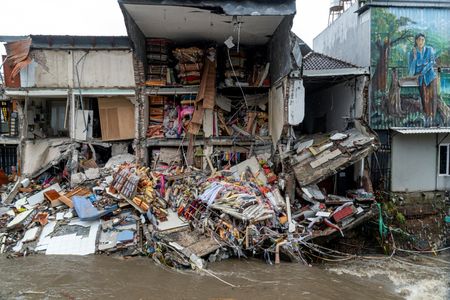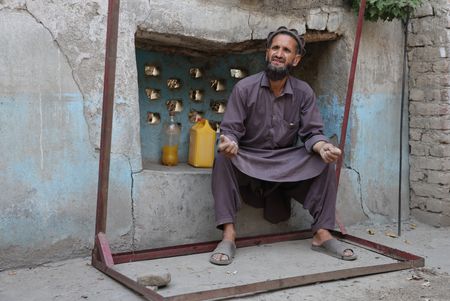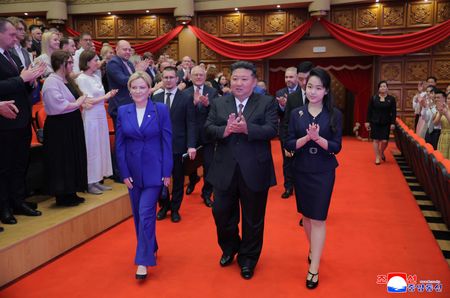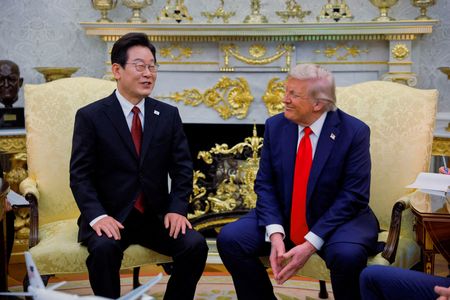By Jack Kim and Ju-min Park
SEOUL (Reuters) – U.S. President Donald Trump offered to allow hundreds of South Korean workers arrested during an immigration raid to stay in the United States, but only one has opted to remain, South Korean officials said on Thursday.
Trump’s overture sought to encourage the workers to stay and train Americans, according to the officials. It resulted in a one-day delay to the departure of a chartered plane to bring the workers home.
The plane is now scheduled to leave the U.S. later in the day. TV footage showed the workers boarding buses outside the barbed-wire clad fences of a detention centre at around 2 a.m. on Thursday to go to Atlanta airport.
Unlike other U.S. deportations, they were not handcuffed – satisfying a key demand from South Korea, which has been horrified by the raid, particularly by the use of armoured vehicles and shackles.
Some 300 South Koreans were arrested last week along with more than 150 others at the Georgia construction site of a $4.3 billion Hyundai Motor and LG Energy Solution project to build batteries for electric cars.
While the raid has been trumpeted by U.S. immigration authorities, it has threatened to destabilise ties at a time when both countries are seeking to finalise a trade deal, and to scare off South Korean investment in the United States which Trump has been so keen to secure.
“Our businesses that have entered the United States are likely in a state of serious confusion,” President Lee Jae Myung told a news conference on Thursday to mark his first 100 days in office.
Lawmakers in Seoul have acknowledged that there may have been some overstepping of the boundaries of a 90-day visa waiver programme or a B-1 temporary business visa.
But South Korean companies have also complained for years that they have struggled to obtain short-term work visas for specialists needed at their high-tech U.S. plants, and had come to rely on a grey zone of looser interpretation of visa rules under previous American administrations.
VISA TALKS
In the wake of the raid, Washington and Seoul have agreed to discuss establishing a new visa category for Koreans, South Korean Foreign Minister Cho Hyun has said.
But current difficulties about sending staff to the U.S. could affect direct investment. “Our businesses that are investing in the United States will no doubt be very hesitant,” Lee said.
Seoul has also asked that the detained workers not be disadvantaged should they seek to re-enter the United States again.
The White House, the U.S. Department of State, and the Department of Homeland Security did not immediately respond to requests for comment.
While the broader impact on South Korean investment in the U.S. has yet to become fully clear, some South Korean workers are decamping in droves from more of LG Energy Solution’s U.S. production sites because of visa concerns, people familiar with the situation said.
LG Energy Solution has also asked its subcontractors to prepare contingency plans and hire local workers, one of the people said.
Many of the detained workers are employees of subcontractors involved in the project. South Korean media also said a smaller number of Japanese and Chinese nationals had also been arrested during the raid.
China’s foreign ministry said its embassy in the United States was working to gain a detailed understanding of the situation and provide necessary assistance to its citizens.
“We urge the U.S. to enforce laws impartially and to ensure the legitimate rights and interests of the involved Chinese citizens,” it said in a statement to Reuters.
Japan has said three of its nationals were affected by the raid and it will take appropriate steps to protect them.
(Reporting by Jack Kim, Ju-min Park, Hyunjoo Jin, Joyce Lee and Josh Smith; Additional Reporting by Colleen Howe in Beijing, Kantaro Komiya in Tokyo and Mrinmay Dey in Bengaluru; Editing by Ed Davies and Edwina Gibbs)

